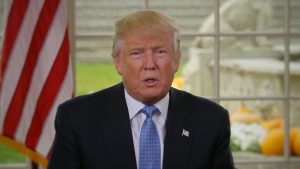In a bold declaration, President-elect Donald Trump has threatened the European Union with tariffs unless they significantly increase imports of U.S. oil and gas, reflecting a strict “America First” trade policy as he prepares to take office.
Trump Pressures EU with Tariff Threats Over Trade Deficit

Trump Pressures EU with Tariff Threats Over Trade Deficit
President-elect sets conditions for trade, warning of tariffs on imports.
Trump's ultimatum comes through a statement on Truth Social, where he emphasized the need for the EU to address their trade deficit with the U.S. This warning is part of a broader pattern as Trump also targeted BRICS nations for their attempts to move away from the U.S. dollar, indicating potential "100 percent" tariffs. Additionally, Trump's plan to implement a 25% tariff on Mexican and Canadian imports underscores his commitment to addressing issues like drug trafficking and immigration through economic measures.
The implications of Trump's aggressive trade strategies suggest a fundamental shift in U.S. international trade relationships and could materially impact global markets. The emphasis on energy exports and tariffs has sparked debates on economic sovereignty, the intertwined global economy, and the future of American trade relations, reflecting differing viewpoints on the benefits and risks involved.
As the international community responds, Trump’s actions may pave the way for new negotiations or further disputes over trade agreements, highlighting the complexity of global trade dynamics in the coming years.
The implications of Trump's aggressive trade strategies suggest a fundamental shift in U.S. international trade relationships and could materially impact global markets. The emphasis on energy exports and tariffs has sparked debates on economic sovereignty, the intertwined global economy, and the future of American trade relations, reflecting differing viewpoints on the benefits and risks involved.
As the international community responds, Trump’s actions may pave the way for new negotiations or further disputes over trade agreements, highlighting the complexity of global trade dynamics in the coming years.






















